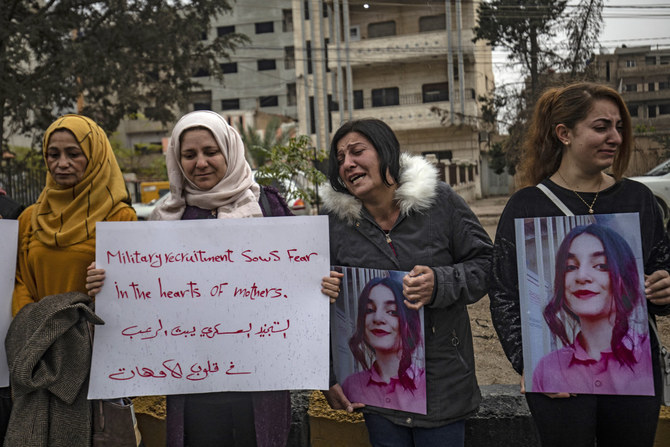Rawan Al-Aleku was visiting a friend in Debrassiye, northeast Syria, in the summer of 2020 when she was conscripted by the Syrian Democratic Forces, an alliance of Kurdish and Arab militias raised in 2014 to fight Daesh. She was just 16 years old.
Narrating Al-Aleku’s story, her Iraqi Kurdistan-based relative Farhad Osso, a human rights activist, told Arab News that the schoolgirl had effectively been kidnapped after her friend’s mother took her to the local Kurdish security office.
Al-Aleku found herself whisked away to a boot camp for young conscripts, where she underwent months of grueling military drills and political indoctrination. All the while, according to Osso, she had no contact with her family.
As the weeks turned into months, Al-Aleku’s father Omran made increasingly angry demands for her release, eventually resulting in his arrest.
When he was released, he published an open letter on Facebook demanding his daughter’s freedom.
“My case is that of kidnapping, the kidnap of a child from her home, her school and her friends and her childhood,” Omran wrote, appealing directly to the SDF’s Commander-in-Chief Mazloum Abdi, who had one year earlier pledged to end the practice of child recruitment.
“These traitors kidnapped my daughter. I have been told you are following through with your pledge, so why is it you apply the rules only where you deem fit? You stole my past, present and future.”
Al-Aleku’s story is not an isolated one in northeast Syria. When Daesh began seizing territory in the summer of 2014, the SDF raised a multi-ethnic alliance that teamed up with the US-led coalition to retake territory from the extremists. In the process, scores of under-aged fighters were swept into its ranks.
Before the Syrian uprising of 2011, Kurdish language and culture were suppressed by the regime of President Bashar Assad.
But when regime troops were withdrawn from Syria’s multi-ethnic north to quell the uprising elsewhere, the Kurds began to manage their own affairs.
It was in 2014, with the emergence of Daesh, that the Kurds mobilized to defend their newfound freedoms.
Syria’s Kurds won global praise for their sacrifices, which resulted in the final territorial defeat of Daesh in the town of Baghuz in March 2019.
The women in the SDF’s ranks were a particular source of inspiration, later depicted as fearsome heroines in movies and even video games.
Rojava, the Kurdish-led autonomous region of northeast Syria, quickly became an epicenter for the broader Kurdish cause, wrapped in the revolutionary socialist zeal of the Kurdistan Workers’ Party, or PKK, of neighboring Turkey.
Once the Daesh threat had receded in Syria, many living in Rojava began to express reservations about the political aims of the main force within the SDF: The People’s Protection Units, or YPG.
The YPG is the militia of the Democratic Union Party, or PYD, a Syrian-Kurdish nationalist group linked to the PKK, which has waged a decades-old guerrilla war against the Turkish state in pursuit of greater political and cultural rights for Kurds in the country’s southeast.
According to a report by the Atlantic Council, to support the PYD’s political and military efforts in Syria, Kurds from Turkey, Iran and Iraq have traveled to Syria to join with the YPG.
Sources told Arab News that while some Syrian Kurds were drawn to the PKK’s ideals, others viewed them as foreign and subversive.
As the SDF’s demand for troops increased to fend off militant attacks and later Turkish cross-border incursions — first in Afrin in 2018, then in northeast Syria in 2019 — SDF conscription quotas began to taken in more and more under-aged fighters, according to the sources.
Osso says he and fellow human rights activists have documented more than 80 similar cases of minors being forcibly conscripted by the SDF.
Among them was a 15-year-old girl who disappeared in December 2021 in the border town of Kobane.
“Her parents received confirmation she was there, but the Revolutionary Youth Movement refuses to give her back,” Osso said, referring to the PKK-affiliated group that conscripted her.
“Generally, all kids who were kidnapped in northern Syria received military and combat training and, most importantly and most dangerously, the kids are subjected to an intense brainwashing, to an extent where they’re told to forget their parents and where they came from,” he added.
“PKK ideals are all that matters. Parents aren’t allowed to have any contact with their children during the time of training.”
As the SDF’s power and influence grew over the course of the war against Daesh, analysts say, so too did the influence of the PKK, which had established a presence in Syria’s northeast at around the same time.

